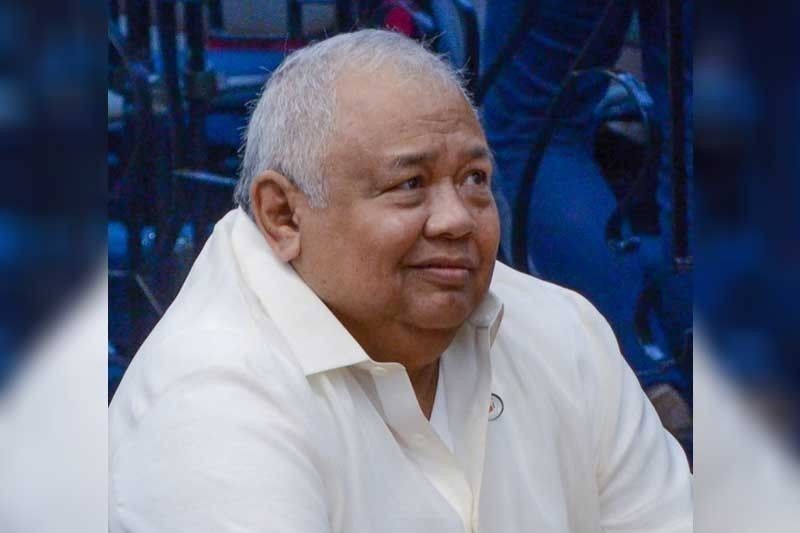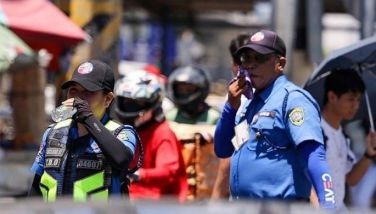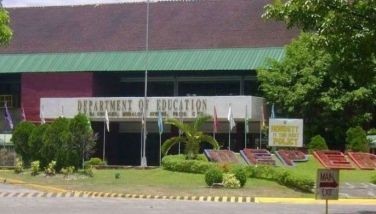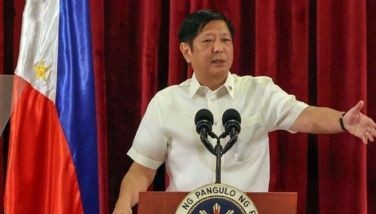Human Rights Day: Palace hits Reds for recruiting kids

MANILA, Philippines — Malacañang lambasted communist rebels for allegedly recruiting children to become child warriors just days after President Duterte expressed readiness to resume peace talks.
In a message for this year’s observance of International Human Rights Day yesterday, Executive Secretary Salvador Medialdea said groups advancing terrorism threaten the implementation of government programs designed to promote the welfare of children.
“There is a serious threat to these efforts by the government. In various parts of the country, our children and youth are exploited by groups that advance terrorism,” Medialdea said in a message released Monday night.
“Children and youth, mostly from indigenous communities and as young as 11 years old, are trafficked by local armed communists, taken to the hinterlands and forced into becoming warriors,” he added.
Medialdea said some of the child warriors have been rescued but others were not as fortunate as they became casualties in armed encounters.
“We are committed to quell this terrorist threat against our children and youth,” the executive secretary said.
Medialdea said the administration would fully implement the Special Protection of Children in Situations of Armed Conflict Act signed by President Duterte last January.
He said new facilities would replace the 55 Salugpongan schools in Mindanao that were closed after they were found to be “training grounds for the raising of child warriors.” ?“In their places, new educational facilities will arise. Through the parents, relatives and loved ones of these children, we shall appeal to the thousands of youth that have been lured to terrorism to return to their families. We shall encourage them to reclaim their role in nation building,” Medialdea said.
Duterte scrapped negotiations with the communists in 2017, saying the rebels’ attacks against government forces reflect their lack of sincerity to pursue lasting peace. The President, however, announced last week that he was open to resuming the talks and is sending labor secretary Silvestre Bello III to the Netherlands to meet with communist leader Jose Maria Sison.
‘A human rights crisis in the country’
In Baguio City, human rights group Karapatan spoke out on the human rights crisis in the country as it urged an investigation into the matter, as well as accountability from the current administration.
“There is a human rights crisis in the country. Regardless of the denials and legal acrobatics by the Duterte government, it has made its mark as a murderous regime that disregards people’s rights,” Karapatan secretary general Cristina Palabay said yesterday.
The Commission on Human Rights (CHR) likewise called for greater state accountability for human rights violations in the country, stressing the need for all to recognize and defend human rights every day as these are products of people’s lives and continuing struggles.
“As we come to another year of this global observance, the commission strongly calls for greater state accountability for all human rights violations in the Philippines and to end impunity that further aggravates the suffering of our people,” the agency said.
“Extrajudicial killings remain to be the biggest attack to human rights in the country as the death toll continues to rise with the government’s anti-people policies,” it added.
The commission also noted the rampant killings of journalists, activists, farmers and other human rights defenders, noting that the existing political environment is hostile to any form of dissent.
“The poor peasants, workers, indigenous and Moro people, women and the youth remain to be the majority of the victims of oppression and violence,” it said.
“As we commemorate International Human Rights Day, we witness how far the country has regressed in terms of upholding, respecting and protecting people’s rights,” Palabay said.
Karapatan said on top of thousands killed in the drug war, they have documented 293 political killings, 167 of whom are human rights defenders. And according to the group’s records, at least 204 were tortured, 429 were victims of frustrated extrajudicial killings, 11 were forcibly disappeared and 94,075 were threatened and harassed.
“It is also under Duterte that the number of political prisoners in the country have sharply risen,” Palabay said as she noted that 382 of the 629 political detainees now in various jails around the country were caught during the Duterte administration.
She highlighted that among the foremost allegedly repressive policies are the administration’s drug war, its counterinsurgency progam Oplan Kapanatagan, martial law in Mindanao, Memorandum No. 32 and its new task force for harassing legal organizations and the National Task Force to End Local Communist Armed Conflict (NTF-ELCAC) created by Executive Order No. 70 (s2018).
“These policies should be junked as they worsen the militarist character of this government. As these policies continue to terrorize communities, it does nothing in solving the social and economic ills plaguing our country,” Palabay said as she urged wide support for the resumption of peace negotiations between the government and the National Democratic Front.
She added, “This government is vindictive, but it is scared and desperate. It capitalizes on narratives aimed at glorifying Duterte and his so-called iron fist rule, but it buckles down when investigations on its crimes against the Filipino people are encouraged and conducted. Alongside the families of victims of human rights violations, we must always remind this government that impunity is not forever; that the day for justice and accountability is just around the corner.”
Simultaneous protest rallies were held in many parts of the country.
“This International Human Rights Day, we defend together. Our collective action is a powerful weapon that has historically put tyrants in their place behind bars. We are reminded that rights do not fall from trees, but that it must continuously be asserted, defended and fought for,” Palabay said.
‘IPs rights trampled’
Igorot-Kalinga Alma Sinumlag, spokesperson of the Philippine Task Force for Indigenous Peoples’ Rights (TFIP), said the present administration has a dismal record in respecting indigenous peoples’ (IPs) rights, citing the most recent violation when the Aeta people in Capas, Tarlac were issued a notice to vacate their land within seven days to make way for projects at the New Clark City amidst the country’s hosting of the Southeast Asian Games.
The TFIP claimed to have monitored and documented human rights violations committed against IPs saying, as of November 2019, there were 63 victims of extrajudicial killings, four victims of enforced disappearance, 18 victims of torture and 26 victims of frustrated extrajudicial killings, among others.
In Mindanao, 19 incidents of forcible evacuation, 39 incidents of military encampment, 16 incidents of indiscriminate firing, 13 incidents of aerial bombardment and 163 incidents of forcible school closure were also documented from July 2016 to present.
Sinumlag said most of the violations were committed in indigenous communities where large projects of corporations and the government are being built or are planned. The lumad in Mindanao have the greatest number of victims of the violation of indigenous peoples’ rights because there is strong resistance against mining operations and applications, logging concessions, plantations and energy projects. Companies and agencies find it hard to get the consent of indigenous peoples who are defending their ancestral lands against projects that endanger their communities. This is true in the Pantaron Mountain Range, the Andap Valley Complex, communities in Bukidnon and South Cotabato and elsewhere.
While IPs, the TFIP said, “are also targets of the government’s counter-insurgency program” justified by the government on the dangerous assumption that more than 70 percent of the members of the New People’s Army and the Communist Party of the Philippines come from lumad and indigenous communities.
Thus, intense military operations with bombings and even firing at houses are carried out in indigenous areas, leading to forced evacuation of whole communities seeking refuge in cities and town centers, Sinumlag lamented.
The TFIP also denounced how indigenous peoples, who occupy lands with still untapped natural resources such as minerals, forests, water and others, “remain deprived and marginalized due to government neglect.” Indigenous peoples are often the least priority in the provision of basic services such as education, health, water, energy, appropriate infrastructure, agricultural support, among others.
Imposing “development” projects in their territories makes things worse as they will be displaced and lose the source of their livelihood and cultures, Sinumlag claimed. – With Art Dumlao, Rhodina Villanueva, Janvic Mateo
- Latest
- Trending
































